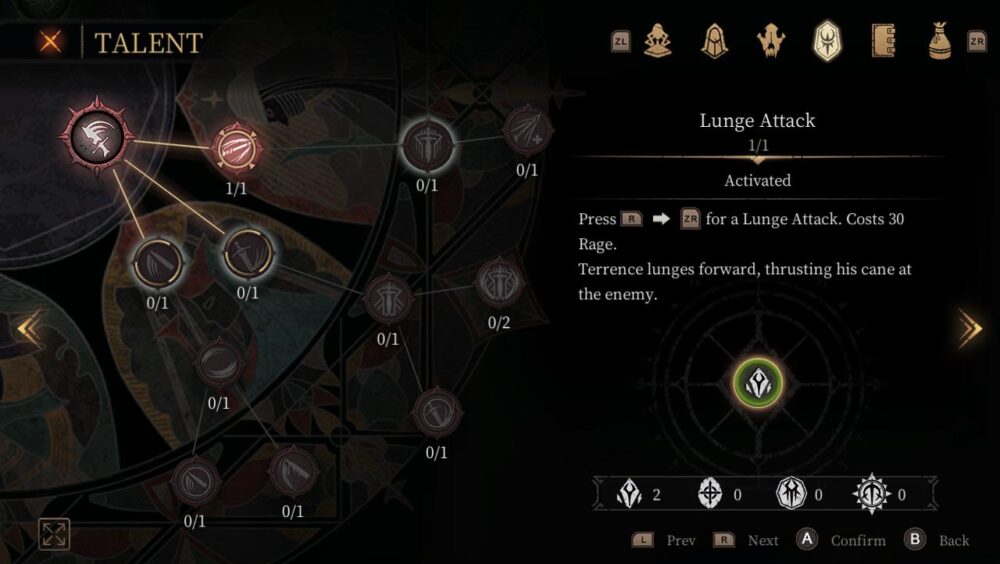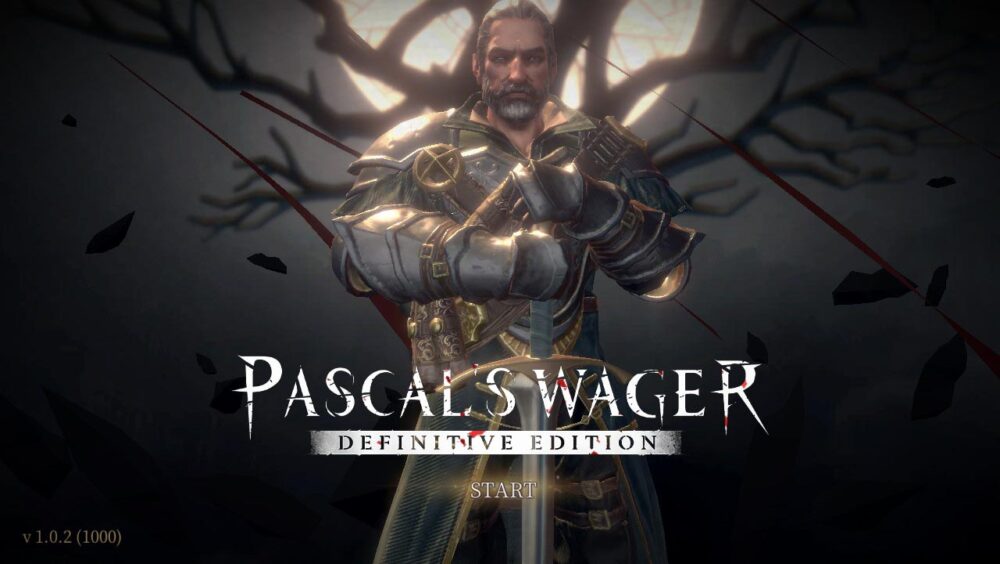If you take a look into the Rogue-like and Souls-like genre, you’ll find that neither of them are wanting for content. However, finding a game that does more than merely ape the gaming conventions of said style, but also understands it, is a difficult task indeed. For my money, while there’s plenty of Souls-likes to go around, very few truly understand what makes the games so compelling to play, instead relying on extreme, controller-throwing difficulty to make their case. The truth is, there’s a lot more to what makes a Souls-like than just that.
So whenever a new game enters the ring, I’m inclined to check it out to see if the developers have managed to capture that From Soft magic. Such was the case when I saw Pascal’s Wager: Definitive Edition announced for Nintendo’s Switch.
Borne of Blood

Now Pascal’s Wager isn’t a new game. In fact, it began its life on the most unlikely of platforms for a Souls-like, as a mobile game back in 2020. In 2021 it was ported over to PC and now, to the Switch. So when I jumped into this one, the game had many questions to answer. Could a mobile Souls-like cut the mustard? Did the developers understand the genre? And, most important of all, how did it play? This, of course, was the most important one as recent titles in the genre have left me feeling cold.
Set in the fantastical medieval inspired world of Solas, players take on the role of Couriers who are tasked with finding out the truth behind this land that has been plunged into darkness once the sun fell. What has happened to the massive Colossi that once brought safety to humanities dwindling numbers? The truth is out there. . .
The developers have kept the basics of the Souls genre intact but have also added enough of their own wrinkles to the formula to keep things fresh.
You know the score by now: Altars to save and rest by, light and heavy attacks, dodge, dodge rolls, blocking and parrying and a stamina bar to keep an eye on. Pascal’s Wagers combat is the same as you’d find anywhere else, just with its own specific timing that took me awhile to get used to. The game plays much slower than most Souls-likes so I had to adjust my timing but once I did, I found the combat system extremely solid. Enemies can be staggered, giving you enough time to perform a heavy damage inflicting execution and there’s a little bit of stealth if you move slowly enough to let you backstab an enemy when you sneak up on them.
Darkest Souls

Added to the base systems are Rage and Sanity meters. Attacking charges up your Rage meter which governs most of your heavy attacks and combos, forcing you to play both offensively and defensively at the same time if you want to be able to make short work of an enemy with a particular combo.
The Sanity meter is by far the biggest wrinkle to overcome. With each attack and enemy defeated, you Sanity gauge dips until you start to reach Abnormal and, finally, Lunatic status. When you hit Abnormal status, you get a variety of visual effects such as auras around enemies to convey your mental state. The reason it matters is because it also buffs up the enemies and changes their attack patterns and moves. This state also spawns in an overpowered ghost version of yourself or the games other characters that can decimate you in seconds.
Boss fights are where the change is most noticeable. It acts like a second phase, buffing them, sometimes changing their appearance and changing their move sets. The developers really want you to fight the bosses in this state as your Sanity meter depletes faster in a boss fight. You can chug a potion to restore some Sanity but it’s only in this phase that the bosses drop extra items specifically geared towards netting you the games True Ending.
Levelling Altars nets you skill points to level the characters. Each level gives you one skill point to use. There’s also a skill tree systems across four disciplines that govern new attacks and how many healing flasks you can carry, for example.
Pascal’s Wager doesn’t stop there with its own take on the formula. You can craft new items to equip for different stat buffs and between all the killing, you can take on sidequests that either further the world lore, perform fetch quests or open up new boss fights.
Finally the game also introduces multiple playable characters to the mix. You’ll pick up new companions as you progress and once they’ve joined your cause, can be taken into the world with you. Sadly, outside of their initial appearance, they don’t help you but can be switched to when not in combat. Effectively they act as a second life as once you die with one character the second will automatically be swapped in. Each of the three extra characters have their own unique play styles with their own timing. Viola, for instance, is the ranged attacker with a gun that has multiple ammo types and one wicked three hit combo that knocks enemies down and gives you enough time to rush back in and repeat that combo, effectively keeping them grounded until dead.
Git Gud?

My favourite thing about Pascal’s Wager is that it eschews the convention that Souls-like need to be hard as hell. The developers have opted for accessibility over masochism and created a game that pretty much everyone can actually finish. They’ve done this by creating an easy mode for the game which, while challenging, isn’t overwhelmingly crushing. And if that isn’t enough for you, between all the accessories to help buff your stats, there’s an item that knocks damage received down by 50%. It’s an optional item but I’d be lying if I said I wasn’t glad that it was there. Purists shouldn’t let this deter them. If you’re playing on normal, there’s plenty of challenge.
Narratively Pascal’s Wager follows both the traditional Souls-like method of storytelling through environmental and item storytelling while also using traditional methods. Sure there are plenty of diaries laying around to read with in-depth lore descriptions for each item, but there’s also just as many conversations with your companions, NPC’s and cutscenes. While you are dropped into the deep end of a world slowly sliding into madness, with plenty of terminology that means nothing initially, the game doesn’t mire you in obscurity that needs a wiki to explain. It just reveals its secrets in due time.
Visually Pascal’s Wager is a rather pretty looking game with a mostly stable frame rate on Switch. Character models are wonderfully detailed, with a comic book aesthetic that reminded me of some of Joe Mads Darksiders designs. Enemies are nicely detailed and animated as well, though they are on the lower polygon side. The same goes for the environment which is pretty, but mostly built from ruins and lower polygon landscapes. It gives the game its own stylised look that fits the hardware perfectly. Pop-in for NPCS’s and environment details is quite common unfortunately.
Unlike most Souls-like, Pascal’s Wager opts for smaller levels that, while having their own looping paths, are self-contained and won’t get you lost in. It’s clearly a limitation from the games original target devices, but one that works very well to create a constant sense of forward momentum.
As the Definitive Edition of the game, what’s included in this release. There’s the Obsession Challenge mode, which is a fight against the games bosses in their Lunatic stakes from the get go, character clothing DLC and, most importantly, a new story DLC area.
Pascal’s Wager: Definitive Edition is an excellent Souls-like that, I feel, understands what a Souls-like should be. With an intriguing story, deep world lore, great visuals and satisfying combat, this Definitive Edition of the game packs a nice punch. Whether you’re looking for something to help scratch that post Elden Ring itch, or a Souls-like to play on the go, Pascal’s Wager: Definitive Edition should definitely be on your radar.
Developer: TipsWorks
Platforms: Nintendo Switch, Android, iOS, Microsoft Windows
Publishers: Giant Games, Yooreka Studio
Enjoy the review? want to read more of our reviews? then click right here to be whisked away to the realm of our opinions.








You must be logged in to post a comment.